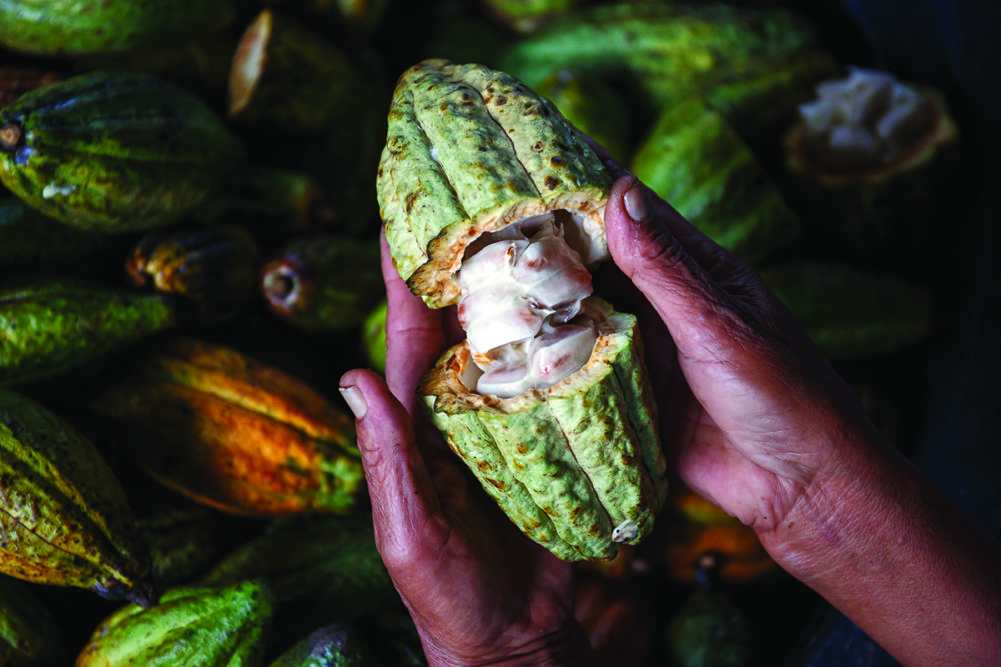Within Barry Callebaut’s Farm Services business, the chocolate company has demonstrated that increased investment into pre-harvest labor, particularly for tree pruning, as well as higher investment in the right mix and amount of soil inputs, can improve cocoa yields and lead to increased farmer income.
For example, Barry Callebaut found that farmers who increased pre-harvest labor to on-average 350 hours per hectare thanks to a pilot project with a customer, experienced higher increases in yield in 2020/21. In comparison, farmers who invested on average less than 50 hours per hectare in pre-harvest labor, showed the lowest yield performance.
Traceability is a cornerstone of Barry Callebaut’s Forever Chocolate commitment to making sustainable chocolate the norm by 2025. Traceability to farm level, knowing where the cocoa we source is grown, plays a crucial role in addressing some of the structural sustainability issues in the cocoa supply chain. Accurate insights into cocoa sourcing, gathered through polygon mapping and geo-localization based on satellite images, are imperative for us in our efforts to eliminate deforestation from the cocoa supply chain.
However, establishing sector-wide traceability is no easy feat. According to the World Cocoa Foundation (WCF), around half of world bean supply is sourced indirectly by cocoa and chocolate companies from independent exporters and traders, mostly due to the regulatory and licensing requirements in origin countries. This makes the development of effective traceability systems a multi-layered undertaking.
Tackling the complexity of the cocoa sector and enabling full traceability requires multi-stakeholder commitment and action, connecting origin and consuming countries to cooperate closely on a broad spectrum of necessary actions. These include precise mapping of farms through polygon mapping, data collection on farmer communities and the setup of human rights and environmental risk assessments.
Outlining the boundaries of a farm through polygon mapping helps establish its proximity to forests and potential risks of expansion into protected areas. Combining this information with additional data on the farmer, their family and the community gives a solid picture of what specific farms need to transition to sustainable agricultural practices. These datasets are a cornerstone in developing robust risk assessments for environmental and human rights abuses in compliance with upcoming due diligence legislation, thus advancing efforts to tackle the main sustainability challenges in the cocoa sector.
Barry Callebaut has already achieved high levels of traceability in its direct supply chain. The company is publicly disclosing the geolocation of its direct suppliers in Côte d’Ivoire, Ghana and Cameroon since 2019. In 2020/21, a total of 240,570 farms located within 25 kilometers of a protected forest area were mapped and monitored. This has led to full traceability for cocoa beans originating from these farms. Overall, Barry Callebaut has reached 80% traceability to cooperative level and 60% to farm level. We are confident we will reach full traceability across our direct supply chain by 2025.
At the same time, Barry Callebaut is focusing on developing projects that aim to transfer traceability know-how from direct to indirect supply chain. In 2021, Barry Callebaut has conducted a pilot program with three key indirect suppliers in Côte d’Ivoire. This initiative involved training our suppliers to enable precise and timely data collection.
As a result of this program, nearly 35,000 farmers were engaged, with polygon data collected for over 18,000 farmers representing around 20,000 cocoa plots covering 45,000 hectares in total. Through this project, Barry Callebaut has gained a great deal of insights into the current maturity level of traceability among local indirect suppliers and how we can best assist them to further improve and scale up their traceability efforts. As a next step, Barry Callebaut plans to onboard an additional 9 suppliers and the cooperatives they source from.
The goal of full traceability must be shared and effectively implemented by each player in the cocoa industry if the industry is to bring sustainability to farming communities and to the global supply chain. Steven Retzlaff, president Global Cocoa, sums up, "We are proud to be a leading company on implementing traceability – and to see the benefits of combining regulatory and industry initiatives in origin and consuming countries.”





